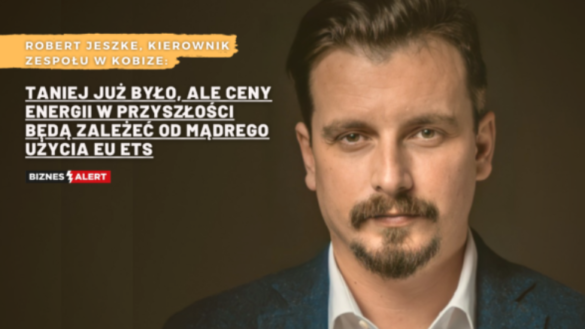Robert Jeszke in Biznes Alert – interview
On December 15, 2021, Robert Jeszke, the head of CAKE, gave a very interesting interview to the BiznesAlert about key elements of Fit for 55 package and the challenges of the energy transformation in Poland and about the need to invest in improving efficiency and low-carbon technologies by financing available under the EU ETS.

Robert Jeszke spoke about the key changes in the EU ETS – the proposal to extend this system to shipping and the introducing of a separate ETS system for transport and buildings, which is highly controversial due to different marginal costs in both sectors. As a result, there is a serious risk of uneven and unfair distribution of the costs of reducing emissions and concerns about social costs for the most vulnerable customers. Introduction of the CBAM border tax will complement the EU ETS. Its main goal is to protect European companies against the risk of carbon leakage and the relocation of production outside the EU (which is a side effect of emission reduction). CBAM will be a kind of motivator for introducing solutions based on carbon prices in other parts of the world, as all EU trading partners will have to pay this tax if they do not create systems comparable to the EU ETS trading system.
Robert Jeszke also referred to the challenges of the energy transformation in Poland and the need for low-carbon investments. Due to the large needs in the energy sector, the need to accelerate the expenditure of funds on investments is growing. In the first place, these funds will come from the EU ETS, including the Modernization Fund dedicated for this purpose, the Innovation Fund, or the newly established Energy Transformation Fund in Poland. Funds should be allocated to the development of electric and hydrogen car charging infrastructure, and to the development of electricity and heating networks. It seems important to change the approach to the concept of what the outlays themselves are – well-planned outlays become an investment in improving the competitiveness of the Polish economy, and not only at the expense of the EU’s climate and energy policy. It is important to carefully develop and consistently implement the climate and energy policy at the national level, taking into account the Polish specificity of the energy mix, as well as Poland financial capabilities.
Back
 Reset ustawień
Reset ustawień Kontrast
Kontrast Widok
Widok Czytelność
Czytelność Czcionka
Czcionka Znaki
Znaki Interlinia
Interlinia Słowa
Słowa Akapity
Akapity Deklaracja dostępności
Deklaracja dostępności









